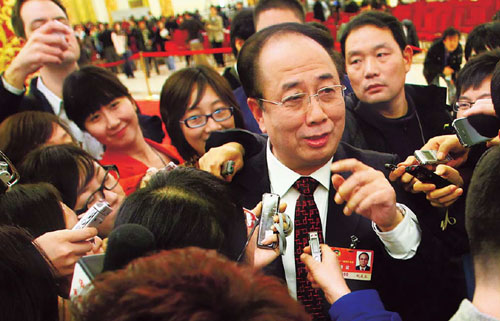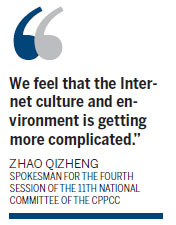Government and Policy
Food safety 'a top priority'
By Wu Jiao, Li Xiaokun and Shan Juan (China Daily)
Updated: 2011-03-03 07:08
 |
Large Medium Small |
Assets of officials will be made public gradually, says spokesman
 |
|
Zhao Qizheng, spokesman for the Fourth Session of the 11th National Committee of the Chinese People’s Political Consultative Conference, is surrounded by reporters after a news conference at the Great Hall of the People in Beijing on Wednesday. [Photo/China Daily] |
BEIJING - A warning to potential food safety offenders has been issued by a senior member of the top political advisory body after a number of incidents of food contamination caused deaths and endangered lives.
Describing the producers of contaminated food as "lacking integrity and shame", Zhao Qizheng, spokesman for the Fourth Session of the 11th National Committee of the Chinese People's Political Consultative Conference (CPPCC), warned that the revised Criminal Law will serve as a deterrent to potential offenders.
Zhao also called on the health authorities and those entrusted with quality supervision to improve monitoring, and asked the media to act as supervisors.
While reducing the number of crimes punishable by death by 13 to 55, the revised law imposes harsher punishments on offenders involved in food-related crimes, including capital punishment.
Zhao issued the warning while asked to comment on recent food-safety scandals at the first news conference of the Fourth Session of the 11th National Committee of the CPPCC, which will last until March 13.
Enterprises must have credibility, and notorious firms like Sanlu, producer of melamine-tainted baby formula products, are doomed to perish, he said.
According to Zhao, China has become increasingly aware of issues involving food safety, as proven by the stricter penalties.
In recent years, food safety has become a major public concern on the mainland after a series of scandals involving the illegal use of prohibited ingredients and additives.
In 2008, melamine-tainted milk powder led to at least six infant deaths and 300,000 fell ill after being fed contaminated products.
The incident has taken a heavy toll on the domestic dairy industry.

Imported dairy products account for half of the domestic market, up 10 percentage points from 2008 when the melamine scandal occurred, said Ma Ying, deputy director of the Dairy Industry Management Office at the Ministry of Agriculture, on Tuesday.
Foreign brands now account for nearly half of China's infant milk powder supply, which totaled 560,000 tons last year.
After the melamine scandal, the State Council established a national food safety commission and appointed Vice-Premier Li Keqiang to head it in February 2009. The NPC Standing Committee later adopted the Food Safety Law.
To enhance supervision, monitoring centers have been set up in 31 provinces, 218 prefectures and 312 counties on the mainland, according to the Ministry of Health.
In 2010, China dealt with 130,000 cases involving food safety, 115 of which were criminal, according to a statement issued by the National Food Safety Regulating Work Office in late January. A total of 248 people involved were arrested.
At the same news conference, Zhao also said that the assets of government officials will gradually be made public.
The process will be time- consuming as China has nearly 10 million civil servants and a large number of people working in government-affiliated institutions, Zhao told reporters.
Currently, government officials are required to report not only their income, property interests and investments, but also if their spouses or children live abroad, he said.
"Many things have to be done, step-by-step, before the definition of assets is made clear," he said.
Members of the CPPCC will carry out more research and suggest proposals to help improve regulations governing the disclosure of assets, Zhao said.
On the influence of online public opinion, Zhao said people should be cautious about "Internet mercenaries", those who post comments online to manipulate others.
"We feel that the Internet culture and environment is getting more complicated," he said.
More and more people use it to exchange views and participate in political issues, Zhao said, noting that China had 457 million Internet users by the end of last year.
But some users, backed by institutions with certain agendas, disguise themselves as ordinary netizens and post comments in order to affect and divert public opinion, or even disturb government policymaking, he said.
This calls for the government's attention and alertness as China lacks legislation in this regard, Zhao noted.
| 分享按钮 |



